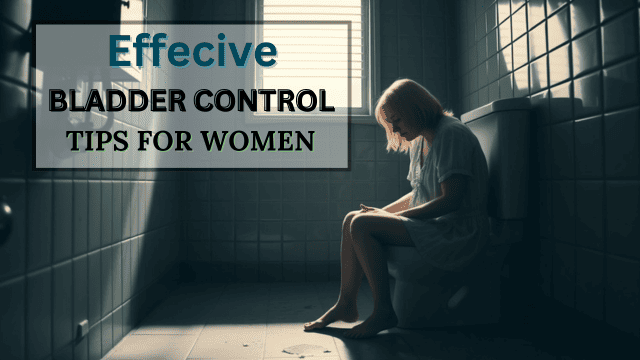
Bladder control is something many women deal with, yet it’s still a topic that can feel a little taboo. Whether it’s occasional leaks or the constant worry of not making it to the bathroom in time, bladder problems can be a real pain. But don’t worry, you’re not alone, and the good news is, there are ways to manage it! This post will dive into practical tips for bladder control, how to strengthen your bladder, and everything in between.
What Is Bladder Control and Why It Matters?
Bladder control refers to the ability to hold urine in your bladder until you’re ready to go to the bathroom. Sounds simple, right? But when things aren’t working quite right, bladder control can become a challenge. For many women, this can lead to incontinence, where you experience urine leakage without being able to control it.
Common Bladder Problems in Women
Women, especially as they age or after certain life events like childbirth, may experience bladder problems. Some common issues include:
- Incontinence: The inability to control urine, often leading to leakage.
- Frequent Urges to Pee: This might feel like you’re always running to the bathroom.
- Overactive Bladder: Where you feel like you have to go urgently, even if there’s not much in your bladder.
- Bladder Weakness: This can cause urine leakage when laughing, coughing, or sneezing.
Signs of Bladder Problems in Females

You might be wondering, “How do I know if I have bladder problems?” Well, here are a few signs to keep an eye out for:
- Sudden urges to urinate that you can’t control
- Leaking urine during physical activities or when sneezing, laughing, or coughing
- Waking up multiple times during the night to pee
- Difficulty fully emptying your bladder
If you’re noticing any of these signs, it’s a good idea to talk with your doctor to get a proper diagnosis.
How to Stop Female Urine Leakage: Tips That Work
Urine leakage can be frustrating, but don’t worry—there are ways to manage it. Here are some effective bladder control tips for women:
1. Strengthen Your Bladder with Kegel Exercises
Kegel exercises are one of the best ways to improve bladder control. These exercises strengthen the pelvic floor muscles, which help support your bladder. To do Kegels, simply tighten the muscles you’d use to stop the flow of urine, hold for a few seconds, then relax. Try doing 10-15 reps a few times a day.
2. Stay Hydrated, But Don’t Overdo It
It’s important to drink enough fluids to keep your bladder healthy. However, drinking too much, especially close to bedtime, can increase the urge to pee. Aim for around 6-8 cups of water a day, and limit beverages that can irritate the bladder, like alcohol and caffeine.
3. Use the Bathroom on a Schedule
Sometimes, your bladder can get used to a routine. Try to go to the bathroom at regular intervals, even if you don’t feel the urge. This can help train your bladder and prevent accidents.
4. Try Bladder Training
Bladder training helps you gradually increase the time between bathroom trips. If you feel an urge to pee, try to hold it for just a few minutes longer each time. Over time, your bladder can hold more urine, and you’ll gain better control.
5. Avoid Bladder Irritants
Certain foods and drinks can irritate your bladder, making incontinence worse. Try to avoid things like spicy foods, artificial sweeteners, citrus, and alcohol. These irritants can trigger sudden urges to pee or even cause leaks.
How to Clean Your Bladder Naturally
While your body does a good job of naturally flushing out toxins, there are some simple habits that can support bladder health:
- Drink plenty of water to help flush out waste from your kidneys and bladder.
- Include bladder-friendly foods in your diet, like cranberries, which can help fight infections.
- Try herbal teas like peppermint or chamomile, which can have a soothing effect on the urinary system.
How to Control Urine While Traveling
Traveling can be tricky when you’re trying to manage bladder control. Here are a few tips that might help:
- Plan ahead: Know where restrooms are along the way. Use bathroom stops as opportunities to take breaks.
- Wear absorbent pads or underwear: These can provide extra peace of mind if you’re worried about leaks.
- Limit caffeine: Caffeine can irritate your bladder and increase the need to go, so try to cut back on coffee or soda while traveling.
What Is the Best Treatment for Bladder Leakage?
The treatment for bladder leakage depends on the severity of the condition. Common treatments include:
- Medications: Doctors may prescribe medications to help manage overactive bladder or incontinence.
- Physical Therapy: Pelvic floor exercises can be incredibly effective in strengthening bladder muscles.
- Surgery: In severe cases, surgery may be an option to support the bladder or treat underlying issues.
How to Strengthen Your Bladder (For Men and Women)
Bladder health is important for both women and men, though the causes of bladder issues can differ. For both genders, Kegel exercises can help strengthen the pelvic muscles, which support the bladder. Maintaining a healthy weight and staying active can also improve overall bladder function.
Lifestyle Changes That Can Help
Making small changes to your lifestyle can make a big difference when it comes to bladder control. Here are some things to consider:
- Maintain a healthy weight: Extra weight can put pressure on your bladder, making incontinence worse.
- Eat a healthy diet: A diet rich in fiber can prevent constipation, which can affect bladder health.
- Exercise regularly: Staying active strengthens your muscles, including the ones that support your bladder.
Conclusion
Bladder control isn’t something to feel embarrassed about—many women experience bladder problems at some point. By incorporating these tips into your daily routine, you can manage incontinence and strengthen your bladder. If you’re struggling with more severe issues, don’t hesitate to reach out to a healthcare professional for support. You’re not alone in this, and with the right approach, you can take control of your bladder health!
Remember, bladder problems don’t define you. With the right care and attention, it’s completely possible to live a life free from worry about leaks or urgent bathroom trips.
